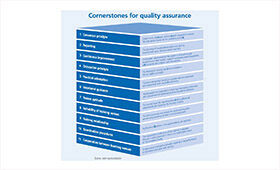Quality Assurance in the German dual vocational system
Quality assurance in the German dual vocational training system takes place at many levels and is closely linked to the long tradition of the system. The following outline focuses on the 11 main quality assurance elements illustrated in the BIBB publication “Quality assurance of company-based training in the dual system in Germany”.
- The consensus principle is based on the cooperation of government, business community and social partners who develop and implement VET standards. The system works succesfully as it is embedded within German society.
- A detailed reporting system is based on institutionalised research and advice. The Federal Institute of Vocational Education and Training (BIBB) is the institution that is in charge of completing these tasks. The most important products in this context are the BIBB VET Data Report, the VET standards, data and statistics.
- Continuous improvement of the system is achieved through modernisation mechanisms, research and development programmes and pilot projects
- Organisation of the system according to “Ausbildungsberuf (training occupation/skills areas)”: „Ausbildungsberuf“ is a German term which usually is translated by the term "training occupation". It means a scientific, social and labour market-based construct and a category of order agreed by consensus between the social partners and the state. With the help of "Ausbildungsberufe" the selection and bundling of activities and the associated necessary qualifications is carried out. Mastery of the work tasks combined in a "Ausbildungsberuf" is the objective of the respective vocational training ("professional competence to act")"1.
- Work-based learning (practical orientation) guarantees that apprentices acquire skills that are relevant for the world of work. The phase of in-company training amounts to 70% of the apprenticeship. The curriculum for work-based learning (training regulations) are monitored and updated on a regular basis by a defined process under the lead management of the BIBB
- Career guidance (vocational orientation) helps young people to find their way within the vocational education system and the world of work.
- The system attaches great importance to the qualification of VET staff, i.e. the trainers in the companies and the VET teachers in schools.
- The suitability of the training venue is initiated as soon as a company registers a training contract with the chamber.
- The rights and obligations of the training contract between the company and the apprentice are regulated.
- The neutrality of examiners is an essential characteristic of quality assurance in the examination system. The principle is that those who provide training must not participate in the examination. For this reason, organisation of examinations is transferred to the chambers and is not carried out by the companies or vocational schools.
- Companies and vocational schools collaborate in the implementation of vocational education and training.
-
1
cf. Laur-Ernst, Dr. Ute: "Das Berufskonzept". Bonn 2002. http://doku.iab.de/ibv/2002/ibv0802_661.pdf (German only)

